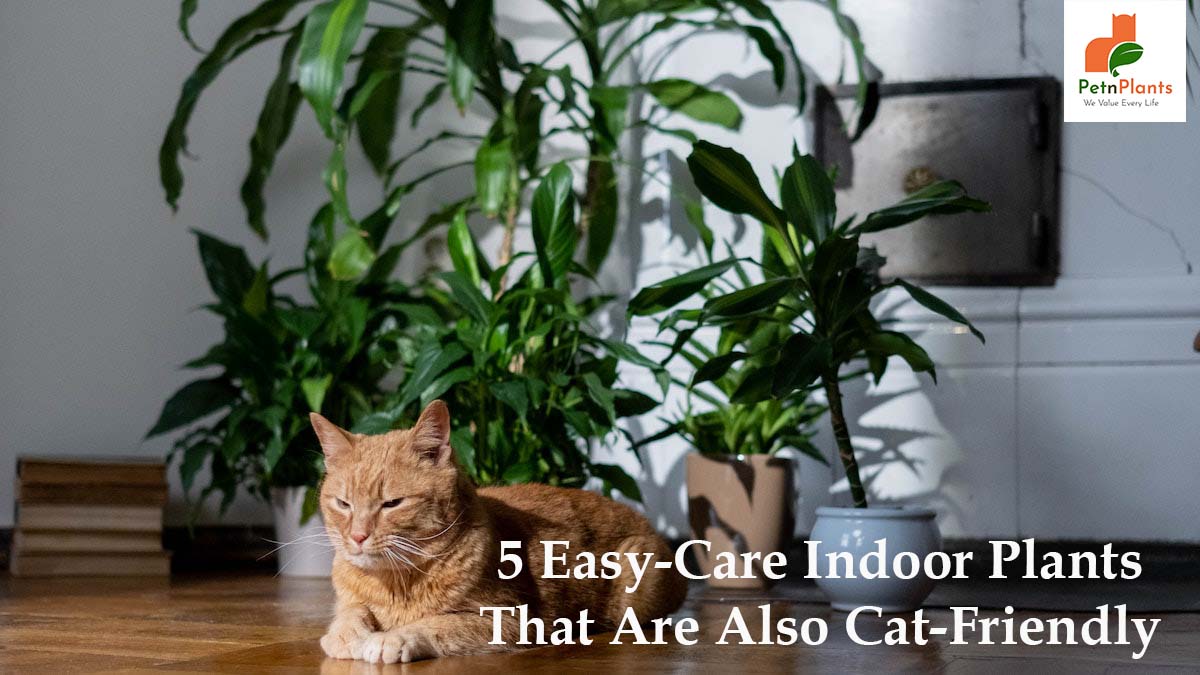How To
Latest
Pet Care
How to Groom Your Dog at Home with the Right Dog Grooming KitMarch 19, 2025
We Value Every Life


Indoor plants are a great way to add some life to your home without worrying about caring for a pet. There are a lot of indoor plants, but if you’re looking for something low-maintenance and cat-friendly, we recommend checking out the plants on this list.
Always consult the veterinarian to check your cats if they consume your houseplants to be safer.
These plants are relatively easy to care for, and most are safe for cats if they nibble on them. Of course, you’ll still need to give them a little attention, but overall they won’t require much work.
Our guide today is Michelle Wilde from “The Indoor Plants Channel.” Michelle is passionate about plants (and is a cat lover!) and will guide us today on how to have safe houseplants for your cat.
Cats are naturally curious creatures and love to explore their surroundings. This can often lead to them getting into places they’re not supposed to, like your houseplants.
While some houseplants are poisonous to cats, many are safe for them to be around. Having cat-friendly plants in your home can benefit you and your feline friend.
Here are the top benefits of having cat-friendly plants in your home:
Certain plants, like spider plants, are great at purifying the air. They help remove harmful toxins and chemicals from the air, making breathing healthier for you and your cat.
Studies have shown that being around plants can help improve your mood and mental well-being. So if you’re looking for a way to brighten up your home and your mood, adding some cat-friendly plants is a great option.
Looking after plants can be a great way to relax and de-stress. And since cats are known to be stress-relievers, having them around your plants can help reduce stress levels.
Let’s be honest; plants just look nice. They can add a touch of greenery and life to any room, making it feel more welcoming and inviting. And who doesn’t want that?
Certain plants, like lavender and jasmine, are known for their calming and relaxing properties. These plants in your bedroom can help improve sleep quality and quantity.
There are plenty of low-maintenance indoor plants that are also safe for cats. Here are five of the best options:

Spider plants are one of the most popular houseplants and for a good reason. They’re easy to care for, tolerate a wide range of growing conditions, and are safe for cats.
The American Society for the Prevention of Cruelty to Animals (ASPCA) lists spider plants as non-toxic to cats and dogs.

Zebra plants (Calathea spp) can thrive in various conditions. The large and stripped plant doesn’t like direct sunlight, and it isn’t harmful to your pets. It, however, requires a lot of water, so it’s advisable to water it at least once a week.
Although zebra plants are safe for cats, there is still some debate as to whether or not they are truly non-toxic. Some research studies suggest that zebra plants may contain toxins that can harm cats, while others claim that zebra plants are not toxic to cats. The jury is still out on this one.

African Violet is another beautiful indoor plant that isn’t toxic to your cats. It’s a native of East Africa and has attractive pink and purple flowers. The plant is low-maintenance, grows well in low light, and is sensitive to environmental changes.
Many research studies suggest that African violets are safe for cats. Most of these studies are based on the fact that African violets contain very low levels of toxins that are not harmful to cats. In addition, African violets are not known to cause allergic reactions in cats. Therefore, they are considered to be safe for cats to ingest.

Butterfly Palm is also called Areca Palm. The plant requires direct sunlight and minimal watering. Fortunately, it’s the kind of plant your cats can safely play with. Areca Palm is elegant and adds a touch of sophistication to your home.
According to recent research, the Butterfly Palm is safe for cats. This plant is native to Africa and has been used for centuries as a natural remedy for various ailments. The Butterfly Palm is rich in vitamins and minerals, and its leaves have anti-inflammatory properties. The plant is also effective in treating skin conditions such as eczema and psoriasis. In addition, the Butterfly Palm is safe for cats because it does not contain any toxic chemicals or pesticides.

Boston ferns are a classic houseplant that’s also safe for cats. They’re relatively easy to care for, although they need a bit more moisture than some other plants on this list. But they’re worth the extra effort, as they’re beautiful plants that can add a touch of elegance to any room.
Although Boston ferns are not toxic to cats, they can cause stomach upset if ingested. Additionally, the ferns’ leaves can cause skin irritation. It is best to keep the plant out of your pet’s reach if you have a Boston fern and a cat.
Caring for low-maintenance plants is easy! Just follow these simple tips, and your plants will thrive.
Not all plants are poisonous to cats, but some can be. If you’re worried about your cat eating your plants, choose plants that are non-toxic to cats. Some safe options include spider plants, snake plants, and Boston ferns.
That depends on the plant. Some plants, like succulents, only need to be watered once a week. Others, like ferns, need to be watered every day. Check the care instructions with your plant to find out how often to water it.
Fertilize your plants every two weeks with a half-strength solution of liquid fertilizer.
Choose pots with drainage holes in the bottom so excess water can drain. This will help prevent your plants from getting too wet and rotting.
Although most cats prefer to spend their time outdoors, some are content with staying indoors. If you have a cat that falls in the latter category, you may be wondering what plants you can keep in your home that won’t be toxic to them.
We’ve listed about five indoor low-maintenance plants that are cat friendly. They aren’t harmful to cats and will serve you well.

Michelle Wilde is a stay-at-home mom and avid plant lover. Armed with a postgraduate degree in Computer Science (no kidding!), she loves researching plants and landscapes. When she is not caring for her 4 kids, she spends time on her passion for plants. She blogs at “The Indoor Plants Channel”, the trusted source for indoor plants.
0